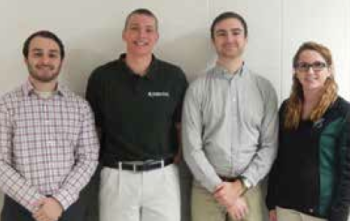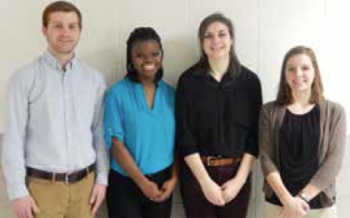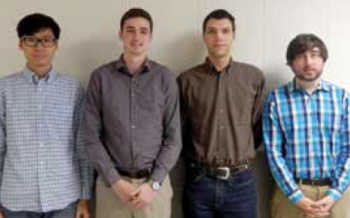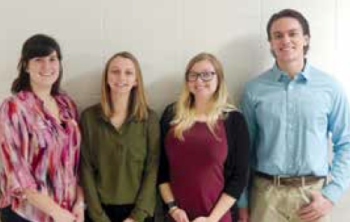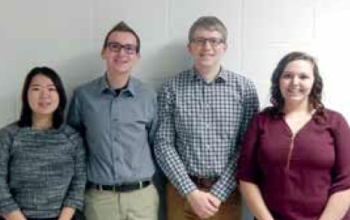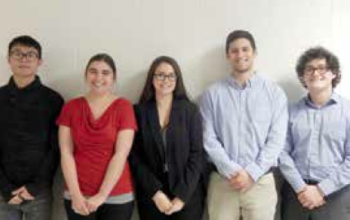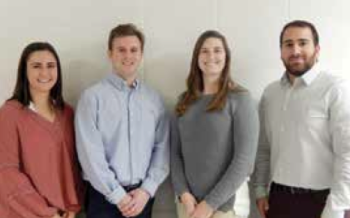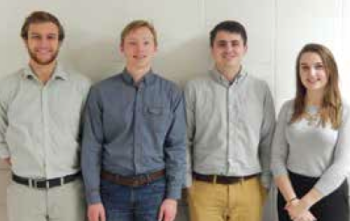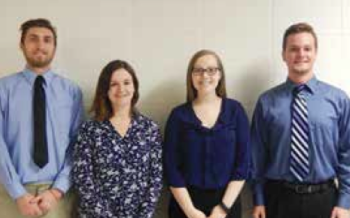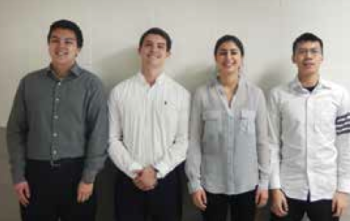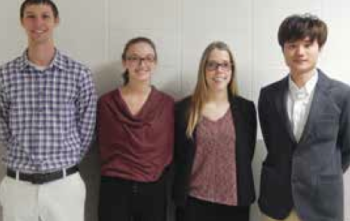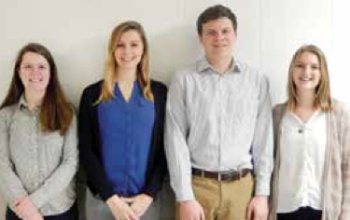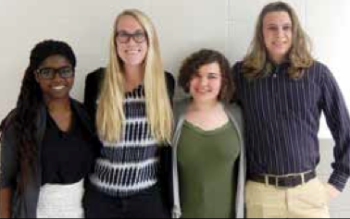Biosystems
Projects
Biosystems Engineering student teams, enrolled in the two-semester biosystems design capstone experience, BE 485/487, develop, evaluate, and select design alternatives in order to solve real-world problems. Projects are diverse, but each reflects systems thinking by integrating interconnected issues affecting the problem, including critical biological constraints. The engineering design process is documented in a detailed technical report. Teams present project designs to engineering faculty and a review panel of professional engineers for evaluation. Each BE 485/487 capstone design team prepares and presents a design solution in report, poster and oral formats to an industry advisory board, faculty, peers and the public that:
- Requires engineering design
- Uses a holistic approach
- Combines biology and engineering
- Interprets data
- Solves a real problem
- Evaluates economic feasibility
For information on sponsoring a project, please contact Dr. Dana Kirk or Dr. Luke Reese.
Biosystems Engineering students participate in Spring Term Design Day. The following were the project sponsors and projects for the Spring of 2017:
Spartan Soil-utions: Soil Phosphorus Management Strategy for Food Manufacturer
 The Spartan Soil-utions were challenged with remediating a former food manufacturing wastewater spray field irrigation site with elevated soil phosphorus levels. The site was used for more than 30 years before discontinuing. The client desired a solution that would return the soil phosphorus levels to the agronomic range with minimal maintenance and oversight. A hybrid poplar planting strategy was chosen for two of the three fields due to its phosphorus uptake ability and low maintenance requirements. The two varieties of poplar will be harvested after ten years and sold as wood chips. The third field will be leased to a neighbor- ing farmer with a recommended corn-soybean rotation to maximize phosphorus uptake.
The Spartan Soil-utions were challenged with remediating a former food manufacturing wastewater spray field irrigation site with elevated soil phosphorus levels. The site was used for more than 30 years before discontinuing. The client desired a solution that would return the soil phosphorus levels to the agronomic range with minimal maintenance and oversight. A hybrid poplar planting strategy was chosen for two of the three fields due to its phosphorus uptake ability and low maintenance requirements. The two varieties of poplar will be harvested after ten years and sold as wood chips. The third field will be leased to a neighbor- ing farmer with a recommended corn-soybean rotation to maximize phosphorus uptake.
Sponsor – Michigan Milk Producers Associations (project under NDA agreement)
Faculty Advisor – Dr. Steve Safferman, P.E.
Sugar BAE’s: Sugar Recovery from Kellogg’s Cereal Waste
T he Kellogg Company is increasing their focus on environmental and economic sustainability. The Sugar BAE’s were tasked with reclaiming sugar waste from cereal production lines. This waste, called “cereal fines,” is a mixture of sugar, starch, vitamins, and other non-sugar impurities, and is currently sold as animal feed. Through a series of separation techniques, sugar is reclaimed from the cereal fines. The reclaimed sugar solution is reinjected into the primary sugar coating stream. The process aims to reduce costs and use of raw materials, while maintaining sugar purity standards.
he Kellogg Company is increasing their focus on environmental and economic sustainability. The Sugar BAE’s were tasked with reclaiming sugar waste from cereal production lines. This waste, called “cereal fines,” is a mixture of sugar, starch, vitamins, and other non-sugar impurities, and is currently sold as animal feed. Through a series of separation techniques, sugar is reclaimed from the cereal fines. The reclaimed sugar solution is reinjected into the primary sugar coating stream. The process aims to reduce costs and use of raw materials, while maintaining sugar purity standards.
Sponsor – Kellogg (project under NDA agreement)
Faculty Advisors – Dr. Yan (Susie) Liu & Dr. Kirk Dolan
Meijer Water Unicorns: Water and Wastewater Reduction at a Food Manufacturing Facility
 What is the best way to reduce environmental impact and save money? Modify water management strategies! This project aimed to minimize water consumption, reduce wastewater surcharges, and determine efficient water management procedures for Meijer plants. A basic water audit was performed at the Meijer Central Kitchen that focused primarily on the deli processing lines. The audit helped determine areas of high water consumption and high strength wastewater generation. Ultimately, three process lines and the facility wastewater system were further examined to determine the greatest potential benefits. Through sample collection, plant observations, and data analysis, it was determined that wastewater system design upgrades will have the largest positive economic and environmental impacts.
What is the best way to reduce environmental impact and save money? Modify water management strategies! This project aimed to minimize water consumption, reduce wastewater surcharges, and determine efficient water management procedures for Meijer plants. A basic water audit was performed at the Meijer Central Kitchen that focused primarily on the deli processing lines. The audit helped determine areas of high water consumption and high strength wastewater generation. Ultimately, three process lines and the facility wastewater system were further examined to determine the greatest potential benefits. Through sample collection, plant observations, and data analysis, it was determined that wastewater system design upgrades will have the largest positive economic and environmental impacts.
Sponsor – Meijer (project under NDA agreement)
Faculty Advisor – Dr. Steve Safferman, PE
Meijer Energizers: Optimizing Heat Transfer for Food Industry Application
 This project involves the development of an energy management plan and funding application to support its implementation. Activities included the performance of a certified energy audit on Meijer’s largest food manufacturing facility augmented by two professional energy auditors. The facility’s energy consumption has been broken down into four major categories: 1) Processes and Controls, 2) HVAC, 3) Lighting, and 4) Weatherization. The audit evaluates recommended energy conservation measures (ECMs) for all the facility’s operations that use energy. Our goal was to reduce energy consumption by 36 %. The funding application will be sent to the USDA Rural Energy for America Program.
This project involves the development of an energy management plan and funding application to support its implementation. Activities included the performance of a certified energy audit on Meijer’s largest food manufacturing facility augmented by two professional energy auditors. The facility’s energy consumption has been broken down into four major categories: 1) Processes and Controls, 2) HVAC, 3) Lighting, and 4) Weatherization. The audit evaluates recommended energy conservation measures (ECMs) for all the facility’s operations that use energy. Our goal was to reduce energy consumption by 36 %. The funding application will be sent to the USDA Rural Energy for America Program.
Sponsor – Meijer (project under NDA agreement)
Faculty Advisor – Mr. Aluel Go and Dr. Truman Surbrook
Meat the Spartans: Waste Handling Process Design Considering Food Safety and Volume Reduction
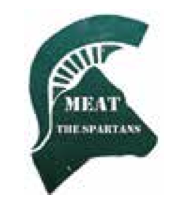 The project was to design a system for collecting and compacting
The project was to design a system for collecting and compacting
plastic waste directly from the processing line of a corned beef
manufacturer. The primary focus was to reduce the possibility of cross-contamination when considering the worker handles both the plastic waste and the food product. Included in the design process was the potential of reducing waste removal costs for the client by increasing the density of the plastic waste. The team delivered the client a detailed analysis of three design alternatives that varied in cost, versatility and complexity.
Sponsor – Grobbel’s (project under NDA agreement)
Faculty Advisor – Dr. Dan Guyer
The Conveyors: Line Conveyor Hygienic Design
![]() The objective of this project was to optimize the JBT FoodTech SaniClean conveyor to increase system hygiene and gain certification from NSF International. NSF certification adds value to food processing equipment. NSF is an internationally accepted certification that the equipment has a reduced risk of foodborne illness by microbial contamination. Cleaning the SaniClean is quick, easy and effective. Modifications further increased the functionality and operational performance of the equipment with regard to sanitary design. The team modified the design to decrease liquid collection, increase material compatibility and create a cleaning protocol validated by riboflavin and ATP swab testing. The conveyor is currently undergoing NSF certification.
The objective of this project was to optimize the JBT FoodTech SaniClean conveyor to increase system hygiene and gain certification from NSF International. NSF certification adds value to food processing equipment. NSF is an internationally accepted certification that the equipment has a reduced risk of foodborne illness by microbial contamination. Cleaning the SaniClean is quick, easy and effective. Modifications further increased the functionality and operational performance of the equipment with regard to sanitary design. The team modified the design to decrease liquid collection, increase material compatibility and create a cleaning protocol validated by riboflavin and ATP swab testing. The conveyor is currently undergoing NSF certification.
Sponsor – JBT Foodtech (project under NDA agreement)
Faculty Advisor – Dr. Brad Marks, PE
Go Clean: Pharmaceutical Machine Internal Cleaning
 Perrigo is a global supplier of over-the-counter pharmaceutical goods. Highly technical equipment is used to bottle and package pharmaceuticals that are in tablet form. Perrigo tasked the GoClean team with reducing labor costs during equipment cleaning while maintaining their same high standard of cleanliness. The current cleaning procedure is a very time-intensive process. The team designed a cleaning fixture that adapts to Perrigo’s current cleaning tools that reduces cleaning time and provides better ergonomics for their cleaning specialists.
Perrigo is a global supplier of over-the-counter pharmaceutical goods. Highly technical equipment is used to bottle and package pharmaceuticals that are in tablet form. Perrigo tasked the GoClean team with reducing labor costs during equipment cleaning while maintaining their same high standard of cleanliness. The current cleaning procedure is a very time-intensive process. The team designed a cleaning fixture that adapts to Perrigo’s current cleaning tools that reduces cleaning time and provides better ergonomics for their cleaning specialists.
Sponsor – Perrigo (project under NDA agreement)
Faculty Advisor – Dr. Vangie Alocilja and Dr. Tim Whitehead
PNL: Evaluation and Reduction of Hazardous Waste Generated During Pharmaceutical Operations
 Perrigo Company is a world leader in the manufacture and distribution of nicotine replacement therapy (“NRT”) products. The Perrigo facility in Holland, Michigan manufactures a portion of the nicotine lozenge product line. EPA classifies nicotine as a hazardous waste. Normal losses, associated with manufacturing and packaging, contribute to a hazardous waste stream. Perrigo desires to minimize this waste stream to reduce their social and environmental impacts. The team designed and implemented a plan to reduce the generation of nicotine hazardous waste by 15% in the packaging process.
Perrigo Company is a world leader in the manufacture and distribution of nicotine replacement therapy (“NRT”) products. The Perrigo facility in Holland, Michigan manufactures a portion of the nicotine lozenge product line. EPA classifies nicotine as a hazardous waste. Normal losses, associated with manufacturing and packaging, contribute to a hazardous waste stream. Perrigo desires to minimize this waste stream to reduce their social and environmental impacts. The team designed and implemented a plan to reduce the generation of nicotine hazardous waste by 15% in the packaging process.
Sponsor – Perrigo (under NDA agreement)
Faculty Advisors – Dr. Darrell Donahue, P.E. & Dr. Jade Mitchell
Destination Restoration: Red Cedar River: Restoration and Naturalization
 The Michigan Department of Natural Resources has consulted with the Ingham County Drain Commissioner to restore the portion of the Red Cedar River between Harrison Road and Kalamazoo Street. The project objective is to design a plan to restore the natural physical features of the river. These features include bankfull dimensions, average river velocity, stream bank stability and an equal inflow and outflow of sediment. The team used the hydraulic modeling software, HEC-RAS, together with Rosgen’s Natural Channel Design to develop a river restoration plan.
The Michigan Department of Natural Resources has consulted with the Ingham County Drain Commissioner to restore the portion of the Red Cedar River between Harrison Road and Kalamazoo Street. The project objective is to design a plan to restore the natural physical features of the river. These features include bankfull dimensions, average river velocity, stream bank stability and an equal inflow and outflow of sediment. The team used the hydraulic modeling software, HEC-RAS, together with Rosgen’s Natural Channel Design to develop a river restoration plan.
Sponsor – Michigan Department of Natural Resources
Faculty Advisors – Dr. Pouyan Nejadhashemi
Runoff Rangers: Urban Storm Water Management and Beneficial Reuse in Urban Agriculture
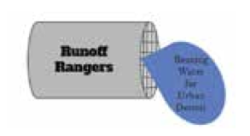 The Detroit Water and Sewage Department (DWSD) has introduced an initiative that charges all Detroit property owners $750 per impervious acre per month to combat stormwater management expenses. Milton Manufacturing is comprised of 9.96 impervious acres,
The Detroit Water and Sewage Department (DWSD) has introduced an initiative that charges all Detroit property owners $750 per impervious acre per month to combat stormwater management expenses. Milton Manufacturing is comprised of 9.96 impervious acres,
which would amount to a $7,500 monthly bill. Our team created a low impact development (LID) design to reduce their drainage bill by reducing their impervious footprint. The team developed a combined LID design to effectively collect stormwater and then reroute it to urban farmland at Pingree Farms. This design will be comprised of downspout disconnect- ion, capture reuse tanks and permeable pavers. After review and approval by a professional engineer and any required permitting, the implementation of this optimal design would generate green infrastructure credits, which will reduce the client’s DWSD bill.
Sponsor – Milton Manufacturing
Faculty Advisor – Mr. Matt Herman & Dr. Fei Pan
Eleven: Tractor Seat Modification for Farmer with Leg Injuries
 This project was to design a seat suspension system to assist a farmer with leg injuries who has difficulty getting on and off his tractor seat while stepping over a gearshift. The team designed and installed an electric-powered seat that can raise and lower him, thus reducing the stress on his legs to cross the gearshift. The seat was attached to a bracket base held to the original tractor seat by clamps, making it a semi-permanent solution. The clamps can be modified in different shapes and sizes to allow the base to be attached to other tractor seats, adding adaptability to the design. This modified seat allows our client to continue his farm work and enjoy his lifestyle.
This project was to design a seat suspension system to assist a farmer with leg injuries who has difficulty getting on and off his tractor seat while stepping over a gearshift. The team designed and installed an electric-powered seat that can raise and lower him, thus reducing the stress on his legs to cross the gearshift. The seat was attached to a bracket base held to the original tractor seat by clamps, making it a semi-permanent solution. The clamps can be modified in different shapes and sizes to allow the base to be attached to other tractor seats, adding adaptability to the design. This modified seat allows our client to continue his farm work and enjoy his lifestyle.
Sponsor – Easterseals Michigan – AgrAbility
Faculty Advisor – Mr. Phil Hill
Team Hope: Development of a Potable Water Treatment System for a Small Farm and Children’s Home in Belize
 Hopewell is a small children’s home and farm in rural Belize operated by Harvest Expeditions, a U.S.-based 501(c)(3) non-profit. Due to a contaminated well, the facility had to purchase city water at a significant cost to their operating account. Hopewell relies heavily on donations to operate, so the added water cost has added pressure to the facility’s financial stability. The team designed a water treatment system featuring hollow fiber filtration to provide Hopewell with clean potable water from the original on-site well. This design provides the client with a safe, cost-effective, low maintenance and sustainable solution.
Hopewell is a small children’s home and farm in rural Belize operated by Harvest Expeditions, a U.S.-based 501(c)(3) non-profit. Due to a contaminated well, the facility had to purchase city water at a significant cost to their operating account. Hopewell relies heavily on donations to operate, so the added water cost has added pressure to the facility’s financial stability. The team designed a water treatment system featuring hollow fiber filtration to provide Hopewell with clean potable water from the original on-site well. This design provides the client with a safe, cost-effective, low maintenance and sustainable solution.
Sponsor– Hopewell, Belize
Faculty Advisor – Dr. Wei Liao, PE
Mackinac Biosolids Initiative: Mackinac Island Biosolids Management
 Mackinac Island is spending approximately $50,000 annually to transport and landfill biosolids from the Wastewater Treatment Plant in the Upper Peninsula. The Mackinac Public Works challenged MBI with finding an alternate use for the biosolids that is
Mackinac Island is spending approximately $50,000 annually to transport and landfill biosolids from the Wastewater Treatment Plant in the Upper Peninsula. The Mackinac Public Works challenged MBI with finding an alternate use for the biosolids that is
more cost-effective, provides for a better beneficial reuse and reduces environmental risk associated with transport. Through research and discussion with the client, aerated static pile composting was found to be the most economical and environmentally friendly solution. Composting converts the material into a Class A Biosolid that is safe for use on lawns and gardens as a carbon rich fertilizer. Utilizing the Class A compost on the Island will reduce costs and enhance environmental sustainability.
Sponsor– Mackinac Island Department of Public Works
Faculty Advisor – Dr. Dana Kirk, PE
Burkina Faso Friends (BFF): Irrigation System for Vegetable Production in Burkina Faso
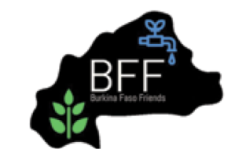 To produce vegetables in Burkina Faso during the dry season, Team BFF designed an irrigation system for a 1⁄4-hectare vegetable farm. The main goals were to improve nutrition, health and income for smallholder farmers with a local sustainable, appropriate-scale mechanized irrigation system. Combining a modified treadle pump and drip irrigation technology powered by solar energy, the team designed a system that will facilitate vegetable production with better water use efficiency and reduced manual labor compared to current practices. Team BFF collaborated with students at University Polytechnic Bobo-Dioulasso to implement the system with the hope of widespread adoption by farmers through demonstration.
To produce vegetables in Burkina Faso during the dry season, Team BFF designed an irrigation system for a 1⁄4-hectare vegetable farm. The main goals were to improve nutrition, health and income for smallholder farmers with a local sustainable, appropriate-scale mechanized irrigation system. Combining a modified treadle pump and drip irrigation technology powered by solar energy, the team designed a system that will facilitate vegetable production with better water use efficiency and reduced manual labor compared to current practices. Team BFF collaborated with students at University Polytechnic Bobo-Dioulasso to implement the system with the hope of widespread adoption by farmers through demonstration.
Sponsor– USAID Appropriate-Scale Mechanization Consortium (ASMC)
Faculty Advisor – Dr. Ajit Srivastava, PE
